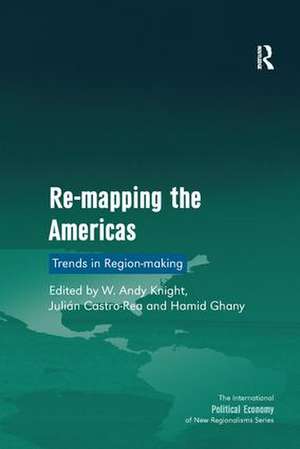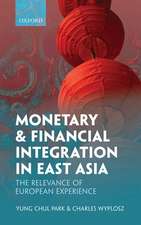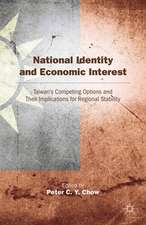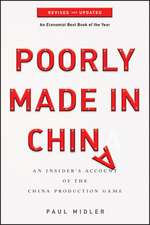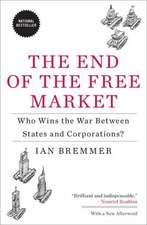Re-mapping the Americas: Trends in Region-making: New Regionalisms Series
Editat de W. Andy Knight, Julián Castro-Rea, Hamid Ghanyen Limba Engleză Paperback – 9 sep 2016
| Toate formatele și edițiile | Preț | Express |
|---|---|---|
| Paperback (1) | 329.98 lei 43-57 zile | |
| Taylor & Francis – 9 sep 2016 | 329.98 lei 43-57 zile | |
| Hardback (1) | 715.33 lei 43-57 zile | |
| Taylor & Francis – 21 apr 2014 | 715.33 lei 43-57 zile |
Din seria New Regionalisms Series
-
 Preț: 312.34 lei
Preț: 312.34 lei -
 Preț: 311.41 lei
Preț: 311.41 lei -
 Preț: 295.51 lei
Preț: 295.51 lei - 15%
 Preț: 715.33 lei
Preț: 715.33 lei - 15%
 Preț: 672.40 lei
Preț: 672.40 lei - 18%
 Preț: 1060.25 lei
Preț: 1060.25 lei - 18%
 Preț: 1000.27 lei
Preț: 1000.27 lei -
 Preț: 377.93 lei
Preț: 377.93 lei -
 Preț: 374.58 lei
Preț: 374.58 lei - 26%
 Preț: 818.67 lei
Preț: 818.67 lei - 26%
 Preț: 765.43 lei
Preț: 765.43 lei - 18%
 Preț: 1003.43 lei
Preț: 1003.43 lei - 15%
 Preț: 703.90 lei
Preț: 703.90 lei - 25%
 Preț: 768.10 lei
Preț: 768.10 lei - 25%
 Preț: 766.85 lei
Preț: 766.85 lei - 25%
 Preț: 768.64 lei
Preț: 768.64 lei - 18%
 Preț: 1061.81 lei
Preț: 1061.81 lei -
 Preț: 380.54 lei
Preț: 380.54 lei - 31%
 Preț: 766.31 lei
Preț: 766.31 lei - 25%
 Preț: 769.37 lei
Preț: 769.37 lei - 25%
 Preț: 767.20 lei
Preț: 767.20 lei - 25%
 Preț: 770.98 lei
Preț: 770.98 lei - 18%
 Preț: 1054.71 lei
Preț: 1054.71 lei - 26%
 Preț: 821.82 lei
Preț: 821.82 lei -
 Preț: 369.73 lei
Preț: 369.73 lei - 18%
 Preț: 1057.40 lei
Preț: 1057.40 lei - 18%
 Preț: 1005.01 lei
Preț: 1005.01 lei - 18%
 Preț: 1008.17 lei
Preț: 1008.17 lei - 18%
 Preț: 1109.66 lei
Preț: 1109.66 lei - 15%
 Preț: 669.94 lei
Preț: 669.94 lei - 18%
 Preț: 1057.09 lei
Preț: 1057.09 lei - 18%
 Preț: 1006.60 lei
Preț: 1006.60 lei - 18%
 Preț: 705.50 lei
Preț: 705.50 lei - 15%
 Preț: 703.08 lei
Preț: 703.08 lei - 18%
 Preț: 1057.89 lei
Preț: 1057.89 lei - 25%
 Preț: 825.63 lei
Preț: 825.63 lei - 18%
 Preț: 1059.45 lei
Preț: 1059.45 lei - 18%
 Preț: 1000.27 lei
Preț: 1000.27 lei - 18%
 Preț: 1061.06 lei
Preț: 1061.06 lei - 15%
 Preț: 669.94 lei
Preț: 669.94 lei - 30%
 Preț: 849.78 lei
Preț: 849.78 lei - 26%
 Preț: 822.86 lei
Preț: 822.86 lei - 18%
 Preț: 1005.80 lei
Preț: 1005.80 lei - 18%
 Preț: 1056.28 lei
Preț: 1056.28 lei - 26%
 Preț: 766.31 lei
Preț: 766.31 lei - 18%
 Preț: 1057.09 lei
Preț: 1057.09 lei - 25%
 Preț: 769.37 lei
Preț: 769.37 lei - 18%
 Preț: 1108.37 lei
Preț: 1108.37 lei - 26%
 Preț: 847.31 lei
Preț: 847.31 lei - 28%
 Preț: 737.94 lei
Preț: 737.94 lei
Preț: 329.98 lei
Nou
Puncte Express: 495
Preț estimativ în valută:
63.14€ • 66.09$ • 52.55£
63.14€ • 66.09$ • 52.55£
Carte tipărită la comandă
Livrare economică 31 martie-14 aprilie
Preluare comenzi: 021 569.72.76
Specificații
ISBN-13: 9781138269828
ISBN-10: 1138269824
Pagini: 434
Dimensiuni: 156 x 234 x 23 mm
Greutate: 0.61 kg
Ediția:1
Editura: Taylor & Francis
Colecția Routledge
Seria New Regionalisms Series
Locul publicării:Oxford, United Kingdom
ISBN-10: 1138269824
Pagini: 434
Dimensiuni: 156 x 234 x 23 mm
Greutate: 0.61 kg
Ediția:1
Editura: Taylor & Francis
Colecția Routledge
Seria New Regionalisms Series
Locul publicării:Oxford, United Kingdom
Notă biografică
W. Andy Knight is Director of the Institute of International Relations (IIR) at The University of the West Indies and Professor and former Chair of the Department of Political Science at the University of Alberta. He served as Governor of the International Development Research Centre (IDRC) from 2007 to 2012, co-edited Global Governance journal from 2000 to 2005 and was Vice Chair of the Academic Council on the United Nations System (ACUNS). Knight has written and edited several books, book chapters and journal articles on various aspects of multilateralism, global governance and peace, and United Nations reform. His recent books include: The Routledge Handbook of the Responsibility to Protect (with Frazer Egerton) -Routledge 2012; Towards the Dignity of Difference?: Neither 'end of History' Nor 'clash of Civilizations' (with Mojtaba Mahdavi) - Ashgate 2012; and Global Politics (with Tom Keating) - Oxford University Press 2010. Professor Knight is a Fellow of the Royal Society of Canada. Julián Castro-Rea (PhD, Université de Montréal) is Associate Professor of Political Science, University of Alberta. His main area of research interest is North American politics (Canada, Mexico, and the United States), both from comparative and trilateral perspectives and he has written extensively on this topic in the three official languages of North America. Among his most recent publications are: Our North America: Social and Political Issues beyond NAFTA (Ashgate, 2012); Le gâchis qu’ils ont fait : comment la droite a ruiné les politiques publiques en Amérique du Nord » in Bulletin d’histoire politique, vol. 21, no. 1, fall 2012, pp. 139-149; and Common Sense or Collusion? Business Interests behind North American Deep Integration, in Fox, Michael and Andrew Nurse, eds., Dynamics and Trajectories: Canada and North America (Fernwood, 2012), pp. 144-160. Hamid Ghany is former Dean of the Faculty of Social Sciences at The University of the West Indies, St. Au
Recenzii
’This re-mapping of the regional politics of the Americas has been deftly undertaken by an able team of scholars working in the Americas. The outcome is a considered, and up-to-date, assessment of contemporary trends in the international politics of this changing region. The late Henry Gill, to whose memory the book is dedicated, would have read it with interest and delight.’ Anthony Payne, University of Sheffield, UK ’A veritable tour de force of key trends that are reshaping a continent, and of how the new regionalism in the Americas is holding up. A must-read for those who want to understand the complex interaction between the Western Hemisphere and global order.’ Jorge Heine, Wilfrid Laurier University, Canada
Cuprins
Part I Backdrop; Chapter 1 Re-mapping the Americas, W. Andy Knight, Julián Castro-Rea, Hamid Ghany; Chapter 2 Regional and Global Governance: Theory and Practice in the Caribbean, Vaughan A. Lewis; Part II Hegemony, Regionalization and the Changing Hemisphere; Chapter 3 The FTAA and its Untimely Demise; Chapter 4 Free Trade: A Tool for US Hegemony in the Americas, Julián Castro-Rea; Chapter 5 Re-mapping Trade Relations in the Americas: The Influence of Shifting Power, Gaspare M. Genna; Chapter 6 CARICOM's Engagement with Latin America: The Community of Latin American and Caribbean States (CELAC), its Promise and Challenges, Mark Kirton; Chapter 7 Latin America in China's Peaceful Rise, Joseph Y.S. Cheng; Chapter 8 Assessing the Developmental Potential of the FTAA and EPA for Small Developing States, Patsy Lewis; Chapter 9 Whither CARICOM?, Matthew Louis Bishop; Part III Regional Security, Governance and Multilateralism; Chapter 10 The Political Economy of Post-9/11 US Security in Latin America: Has Anything Really Changed?, Greg Anderson; Chapter 11 The Constitutional and Political Aspects of Strategic Culture in Trinidad and Tobago, Hamid Ghany; Chapter 12 From Engagement to Influence: Civil Society Participation in the EPA Trade Negotiations and Regional Integration Processes, Annita Montoute; Chapter 13 Caribbean Integration: Can Cultural Production Succeed where Politics and Economics have Failed? (Confessions of a Wayward Economist), Norman Girvan; Chapter 14 Liberalization of Fair Trade or Globalization of Human (In)security? Protecting Public Goods in the Emerging Economic Integration of the Americas, Obijiofor Aginam; Chapter 15 The Dynamics, Limits and Potential of Formal Liberal Democracy in Latin America, Fred Judson; Chapter 16 Why Democracy and the Free Market are Good for Caudillos : The Nicaragua Case, Kalowatie Deonandan; Chapter 17 Conclusions, W. Andy Knight, Julián Castro-Rea, Hamid Ghany;
Descriere
The book informs academic as well as non-academic audiences about regional developments in the Americas, in particular those dating back to the last twenty years. Beyond the primary purpose of summarizing the hemisphere’s recent trends, the book also brings clarification in a detailed but easy to understand way about timely issues regarding the institutionalisation, or lack thereof, of the plethora of regional and sub-regional bodies that have emerged in this hemisphere over the past couple of decades.
